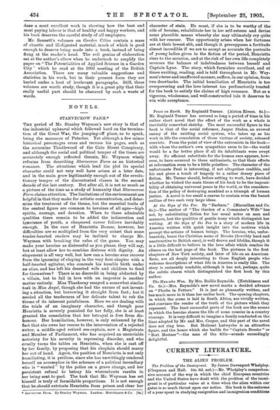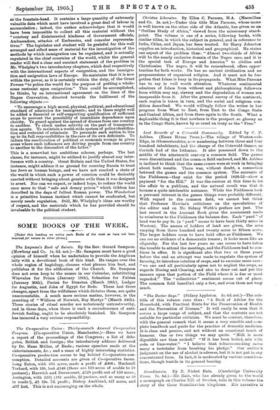THE ALIEN PROBLEM.
The Problem of the Immigrant. By James Davenport Whelpley. (Chapman and Hall. 10s. 6d. net.)—Mr. Whelpley's comprehen- sive account of the way in which the chief European countries and the United States have dealt with the problem of the immi- grant is of particular value at a time when the alien within our gates is so much thrust upon our notice. His book is the outcome of a year spent in studying emigration and immigration conditions at the fountain-head. It contains a large quantity of extremely valuable data which must have involved a great deal of labour in accumulation ; indeed, the author acknowledges that it would have been impossible to collect all this material without the " courtesy and disinterested kindness of Government officials, Ambassadors, attaches of Embassies, and consular representa- tives." The legislator and student will be grateful for this well arranged and sifted mass of material for the investigation of the methods by which immigration can be regulated, and is actually regulated in the chief countries of the world, whilst the general reader will find a clear and succinct statement of the problem in Mr. Whelpley's two introductory chapters, which deal respectively with the international aspects of emigration, and the immigra- tion and emigration laws of Europe. He maintains that it is now within the power, as it is certainly within the duty, of the Great Powers "to police the world for the purpose of putting a whole- some restraint upon emigration." This could be accomplished, he thinks, by an international agreement on the lines of the Hague Convention, directed towards the fulfilment of the following objects :—
" To encourage a high moral, physical, political, and educational standard of admission for immigrants; and to these might well be added a financial or self-supporting qualification of sufficient scope to prevent the possibility of immediate dependence upon charity. To guard against the spread of disease from one country to another. To check undue activity on the part of transporta- tion agents. To maintain a world-wide system of policeidentifica- tion and restraint of criminals. To persuade each nation to live up to its full responsibilities in the care of its own deficients. To induce the amelioration of political or economic wrongs in given areas where such influences are driving people from one country to another to the discomfort of the latter."
This is a somewhat too ambitions scheme, perhaps. The last clause, for instance, might be utilised to justify almost any inter- ference with a country. Great Britain and the United States, for instance, might adduce it as ground for coercing Russia to treat her Jews as human beings, and we have not reached a state of the world in which such a power of coercion could be desirably exerted without bringing about greater evils than it was designed to avert. Nor can we expect, or indeed hope, to reduce the world once more to that " safe and dreary prison " which Gibbon has described in the days of fullest Roman power. The Wanderlust is a primitive human instinct which cannot be eradicated, but merely needs regulation. Still, Mr. Whelpley's ideas are worthy of respect, and the materials which he has provided should be invaluable to the political student.











































 Previous page
Previous page